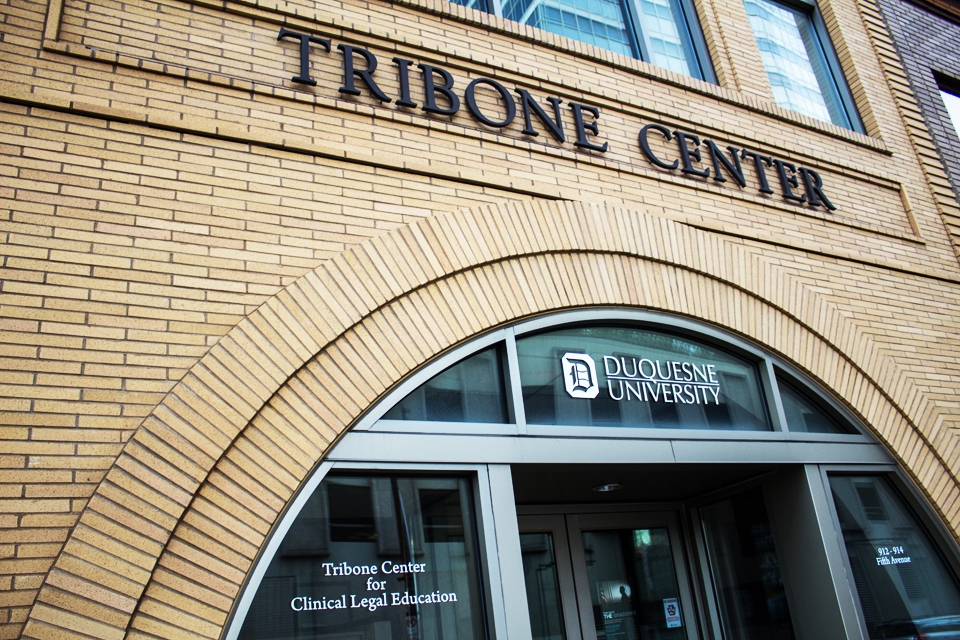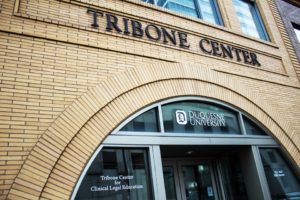
The Tribone Center on Fifth Avenue holds the office for the new Pittsburgh office of the Pennsylvania Innocence Project, which opened in September.

The Tribone Center on Fifth Avenue holds the office for the new Pittsburgh office of the Pennsylvania Innocence Project, which opened in September.
Raymond Arke | Asst. News Editor
Innocent until proven guilty is the standard for the American criminal justice system. However, that process can sometimes fail, resulting in innocent people going to jail. A 2014 study published in The Proceedings of the National Academy of Sciences suggests 4 percent of prisoners on death row, a relatively small population in prisons, may be innocent. Duquesne students can now be part of a nationwide effort to exonerate innocent inmates.
The Pennsylvania affiliate of the Innocence Project, a nationwide organization which works to help free those wrongly convicted, has just recently opened an office in Duquesne’s Tribone Center, which gives Duquesne and Pitt law students the ability to help exonerate innocent convicts.
Elizabeth DeLosa, a 2010 Duquesne law grad, is the managing attorney of the Pittsburgh office of the PA Innocence Project. She said the Project not only works on exoneration but also tries to “prevent wrongful convictions through legislation and policy development.”
The Pittsburgh office is relatively new. DeLosa said she was hired in June of this year and they had an “official opening” in September.
President Ken Gormley, the former law dean and a legal scholar, is extremely proud to have an office of the Pennsylvania Innocence Project open on campus. He described it as “a huge coup for Duquesne to serve as its home.”
This was something that he worked for since 2008 when Professor Rago suggested the idea, saying it could be “a real feather in the cap [for Duquesne],” Gormley recounted.
Once Gormley became dean of the law school, he took steps to attract an office of The Innocence Project.
“One of the first things as dean was to establish a stand-alone law clinic. I insisted we reserve space for the Innocence Project,” he said.
Talks began with Marissa Bluestine, the legal director of the Pennsylvania Innocence Project, in 2011.
“Everyone was excited,” President Gormley said.
The office was finally established over the summer of 2016. Gormley believes Duquesne’s partnership with the project works with the the university’s mission.
“[The Innocence Project] literally saves lives … One of the most wonderful gifts to be given is to provide representation to the innocent to reclaim their lives,” he said. “It is consistent with the Spiritan mission.”
Duquesne students at the Project are immediately thrown into the work.
“We have four Duquesne law students, each assigned an active case to determine if there is an active claim of innocence,” DeLosa said.
The steps they go through on each case is not easy.
“It’s a long process. We are very careful … we get new cases everyday,” she said.
The work begins when the office receives a letter from an inmate. Once the office gets that, they determine if it is something that is worth taking or is even possible to take.
DeLosa said they want to make sure the inmate’s case “meets some basic requirements” before they fully pursue it. That would mean seeing if the inmate had exhausted all his or her’s direct appeals and if the case is one that seems to have the possibility of innocence.
If the case meets the basic standards, then the Innocence Project sends the inmate a 12-page questionnaire about their case to fill out. The purpose of this is “to get the inmate’s side of the story,” DeLosa said.
If the inmate’s story seems solid, DeLosa said they pass the case to an outside attorney for a “preliminary review.” Then after that, the law students are put in charge of an inmate’s case.
“The student will get every single bit of paper from the case, even speak to the inmate,” Delosa said. “They will reconstruct the entire trial.”
It is up to the student then to determine whether or not to continue to pursue the case.
“If the student thinks there’s a legitimate claim of innocence, then we take it to an unbiased panel of attorneys and former prosecutors,” DeLosa said. If they approve of the student’s opinion, then the Innocence Project begins work on freeing the inmate.
Susannah Glick, a third year law student at Duquesne, is one of the students interning at the Innocence Project office. She chose to work there because she hoped to help make a difference.
“I decided to get involved because I am passionate about pursuing a public interest legal career and am dedicated to helping vulnerable populations,” she said.
Glick described what kind of work the students had to do.
“It is our role to closely examine their case to see if there are any post-conviction legal recourses that can be taken,” she said.
The process generally requires a lot of in-depth work. Students “do a lot of file review, research and investigation in the office,” Glick said. That means they get to dig through various court documents and reach out to the inmate’s former lawyers.
Working on protecting these vulnerable clients is something Glick holds dear.
“They are separated from their families and all the norms of their previous lives and put in prisons where they suffer mentally and psychologically,” she said. “I came to law school committed to being a zealous advocate for populations ignored and silenced by society.”
As part of her experience at the Innocence Project and because of her interest in inmate justice, Glick lobbied for compensation legislation at the Pennsylvania State Capitol in Harrisburg.
Compensation legislation would require inmates exonerated of a crime to be paid to make up for the years of lost wages and the experience of being wrongly jailed.
“Pennsylvania is in the minority of states that does not provide any monetary compensation for exonerees. Thus, when an innocent person is exonerated, they walk out of prison with nothing,” Glick said.
Glick wants to ensure that these newly-freed people can readjust to society. She said it is “important” to make sure convicted criminals have the “opportunity to make a new life for themselves” after being wrongfully convicted. She wants to protect them having having to “continue suffering” because of the false accusations.



